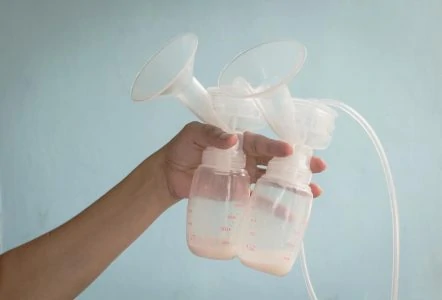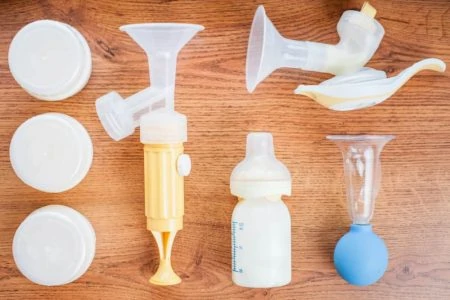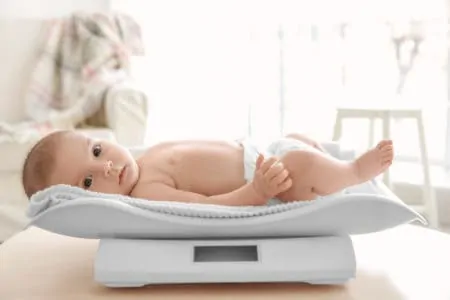Did you quit smoking during pregnancy but find yourself craving cigarettes now that your baby is born? Are you breastfeeding and concerned about the potential side effects of smoking on your child?
Studies have shown almost half of women who give up their habit during pregnancy return to smoking within six months of giving birth (1). But what effects does smoking have on you, your breast milk, and your baby?
Key Takeaways
- Smoking while breastfeeding transfers nicotine to the baby through breast milk, potentially affecting sleep patterns and increasing SIDS risk.
- Second-hand and third-hand smoke exposure can also harm the baby’s developing lungs and circulatory system.
- Marijuana and vaping can introduce THC and other chemicals into breast milk, but more research is needed to understand the full effects.
- Quitting smoking is the safest option, but if that’s not possible, cutting down on cigarettes and increasing time between smoking and nursing can help reduce risks.
Does Smoking Affect Your Breast Milk?
The short answer is yes. There’s strong evidence that a nursing mother passes nicotine to her child through her breast milk (2). What’s more, while breast milk doesn’t transmit every chemical found in cigarettes, the amount of nicotine transferred through nursing is twice as much as the amount transferred through the placenta (3).
It’s one thing to look at statistics, but what do all these facts mean for you and your baby?
How Smoking Can Affect a Mother
Smoking may affect a nursing mother in the following ways:
- Changing the taste of breast milk.
- Causing her to produce a smaller overall breast milk supply.
- Reducing her motivation to breastfeed, sometimes resulting in early weaning.
How Smoking Can Affect Your Baby
Smoking may affect a breastfeeding baby in the following ways:
- Altering the baby’s regular sleep patterns — sleeping for shorter periods.
- Making the baby more susceptible to Sudden Infant Death Syndrome (SIDS) (4).
- Changing the baby’s behavioral patterns, such as making them more prone to colic.
In addition to the above effects, researchers have found traces of nicotine in babies’ blood and urine (5). This means a smoking mother passes on chemical substances through her breast milk to her child. And that child’s immature bodily systems (such as the liver and lungs) aren’t as efficient at removing those toxins.
The case seems to be open and shut — but it isn’t. You might be surprised to learn that experts, like those at the American Academy of Pediatrics (AAP), still believe the benefits of breastfeeding a child outweigh the potential adverse side effects of the mother smoking.
Second- and Third-hand Smoke
While the nicotine in your breast milk may affect your baby directly, it’s not the only way that smoking can cause problems.
Second-hand smoke is created by the burning cigarette itself and is also the smoke that is exhaled by the person smoking. This creates an environment where non-smokers are exposed to harmful chemicals.
When a baby is exposed to second-hand smoke, their SIDS risk increases. Your baby’s developing lungs and circulatory system are especially sensitive to exposure.
Third-hand smoke is the smoke residue that remains on your skin, hair, and clothes, as well as throughout your environment (such as on the couch cushions, walls, carpets, seats in the car, etc.). The AAP considers this exposure dangerous to the health of children and babies as well (6).
What About Other Kinds of Smoke?
So maybe you don’t smoke cigarettes, but you participate in other kinds of recreational smoking. The legalization of marijuana has been on the rise. So has the sale and use of e-cigarettes, also known as vaping.
While the stigma for both of these substances is generally dissipating, the effects they have on health apply to absolutely everyone — that includes you and your baby. How do these other substances affect breastfeeding?
Smoking Marijuana While Breastfeeding
THC (tetrahydrocannabinol — yeah, it’s a mouthful) is the substance in marijuana that produces mind-altering side effects in the brain. Once it goes into your bloodstream, it concentrates in your breast milk.
Some babies exposed to THC through breast milk will feed less frequently and for shorter periods (8).
What’s more, some research has shown that THC can cause delayed motor development by the time your baby hits their first birthday. Meanwhile, other research says there are no effects.
While there need to be more studies done on the effects of marijuana and breastfeeding, early evidence points to the fact that it could have substantial repercussions for a baby’s developing brain.
Mothers seeking medical marijuana for pain or anxiety could consider seeking counseling from a doctor for other solutions.
Vaping While Breastfeeding
E-cigarettes are smoking alternatives that often contain a mix of nicotine and other chemicals. Because they are relatively new on the market, the jury’s still out on whether they are actually safer than cigarettes.
E-cigs use chemical cartridges that contain nicotine and other toxic substances — they’re not risk-free. However, one study stated that e-cigarettes are approximately 95% less harmful to your health than cigarettes and can help people kick their smoking habit altogether when coupled with a program (9).
There’s not enough evidence, though, to say this is safe when breastfeeding. So while vaping might be safer overall, it is still filtering nicotine and chemicals into your system and breast milk.
To Quit or Not To Quit?
The only way to make sure your baby isn’t at risk of exposure to any kind of smoke through breast milk is to quit smoking. If you are having issues quitting, don’t be tempted to give up breastfeeding.
Remember, overall, the consensus is that the benefits of breastfeeding outweigh the risks of smoking.
However, it is a good idea to cut back if you can’t quit. The fewer cigarettes you smoke, the better it is for you and your little one.
One study tested the breast milk of smoking women for cotinine, a substance found in tobacco, and discovered the amount detected in the milk was directly linked to the number of cigarettes being smoked. Smoking five or fewer cigarettes will have far fewer side effects than smoking 20 or 30 of them.
If You Can't Quit
If you’re cutting back and feel ready to take the next step toward quitting, read on.
Safe Ways To Quit Smoking
These are some of the safest methods for quitting smoking.
1. The Cold Turkey Method
This method involves tossing your cigarettes and giving them up entirely. That’s it. Simple right?
Going cold turkey might be challenging, but it has a surprisingly high success rate. Studies have shown that the cold turkey method is far more effective than weaning slowly (10).
2. The Baby Steps Method
If going completely off cigarettes right off the bat sounds intense, you can try slowly reducing the number of cigarettes you smoke over days or weeks. This may help the symptoms of nicotine withdrawal, especially if you are a heavy smoker.
3. The Substitute Method
Nicotine Replacement Therapy (NRT) uses nicotine gum, lozenges, patches, or other forms of nicotine to curb cravings. It’s important to consult with a doctor before starting any kind of NRT program. This method can improve your chances of success from one in 20 to one in 10.
The amount of nicotine your baby would get through your breast milk with this method is much less than with smoking.
Editor's Note:
Michelle Roth, BA, IBCLC4. Counseling
This system is great because you can combine it with any of the above treatments. Having someone to vent your frustrations to can be immensely helpful and can boost your chances of quitting for good by half.
5. The Other Ways
There are many other ways to quit smoking. Some people will turn to hypnosis, while others will replace smoking with a different, healthier habit. You have to decide which method might work best for you.
Smoking and Breastfeeding FAQs
The Bottom Line
Smoking or not smoking while breastfeeding is a personal decision. While the best solution for a mother, her baby, and her breast milk is to cut down or quit smoking any substance — that’s not always the immediate and realistic solution.
But remember, experts believe that even breast milk containing traces of nicotine and other chemicals from smoking is healthier for a newborn than no breast milk at all. It’s ultimately up to you to decide for yourself what will keep you and your baby happy and healthy.












